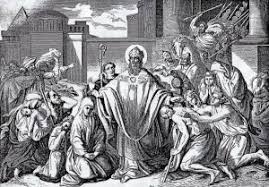Easter-day xxiv Pharmuthi; xiii Kal. Mai; ‘ra Dioclet. 46; Coss. Gallicianus, Valerius Symmachus; Proefect, Magninianus; Indict. iii.
AGAIN, my brethren, is Easter come and gladness; again the Lord hath brought us to this season; so that when, according to custom, we have been nourished with His words, we may duly keep the feast. Let us celebrate it then, even heavenly joy, with those saints who formerly proclaimed a like feast, and were examples to us of conversation in Christ. For not only were they entrusted with the charge of preaching the Gospel, but, if we enquire, we shall see, as it is written, that its power was displayed in them. ‘Be ye therefore followers of me[1],’ he wrote to the Corinthians. Now the apostolic precept exhorts us all, for those commands which he sent to individuals, he at the same time enjoined upon every man in every place, for he was ‘a teacher of all nations in faith and truth[2].’ And, generally, the commands of all the saints urge us on similarly, as Solomon makes use of proverbs, saying, ‘Hear, my children, the instruction of a father, and attend to know understanding; for I give you a good gift, forsake ye not my word: for I was an obedient son to my father, and beloved in the sight of my mother[3].’ For a just father brings up [his children] well, when he is diligent in teaching others in accordance with his own upright conduct, so that when he meets with opposition, he may not be ashamed on hearing it said, ‘Thou therefore that teachest others, teachest thou not thyself[4]?’ but rather, like the good servant, may both save himself and gain others; and thus, when the grace committed to him has been doubled, he may hear, ‘Thou good and faithful servant, thou hast been faithful in a little, I will set thee over much: enter into the joy of thy Lord[5].’
2. Let us then, as is becoming, as at all times, yet especially in the days of the feast, be not hearers only, but doers of the commandments of our Saviour; that having imitated the behaviour of the saints, we may enter together into the joy of our Lord which is in heaven, which is not transitory, but truly abides; of which evil doers having deprived themselves, there remains to them as the fruit of their ways, sorrow and affliction, and groaning with torments. Let a man see what these become like, that they bear not the likeness[7] of the con versation of the saints, nor of that right understanding, by which man at the beginning was rational, and in the image of God. But they are compared to their disgrace to beasts without understanding, and becoming like them in unlawful pleasures, they are spoken of as wanton horses[7a]; also, for their craftiness, and errors, and sin laden with death, they are called a ‘generation of vipers,’ as John saith[8]. Now having thus fallen, and grovelling in the dust like the serpent[9], having their minds set on nothing beyond visible things, they esteem these things good, and rejoicing in them, serve their own lusts and not God.
3. Yet even in this state, the man-loving Word, who came for this very reason, that He might seek and find that which was lost, sought to restrain them from such folly, crying and saying, ‘Be ye not as the horse and the mule which have no understanding, whose cheeks ye hold in with bit and bridle[10].’ Because they were careless and imitated the wicked, the prophet prays in spirit and says, ‘Ye are to me like merchant-men of Phoenicia[11].” And the avenging Spirit protests against them in these words, ‘Lord, in Thy city Thou wilt despise their image[12].’ Thus, being changed into the likeness of fools, they fell so low in their understanding, that by their excessive reasoning, they even likened the Divine Wisdom to themselves, thinking it to be like their own arts. Therefore, ‘professing themselves to be wise, they became fools, and changed the glory of the incorruptible God into the likeness of the corruptible image of man, and birds, and four-footed beasts, and creeping things. Wherefore God gave them over to a reprobate mind, to do those things which are not convenient[13].’ For they did not listen to the prophetic voice that reproved them (saying), ‘To what have ye likened the Lord, and with what have ye compared Him[14]?’ neither to David, who prayed concerning such as these, and sang, ‘All those that make them are like unto them, and all those who put their trust in them[15].’ Being blind to the truth they looked upon a stone as God, and hence like senseless creatures, they walked in darkness, and, as the prophet cried, ‘They hear indeed, but they do not understand; they see indeed, but they do not perceive; for their heart is waxen fat, and with their ears they hear heavily[16].’










